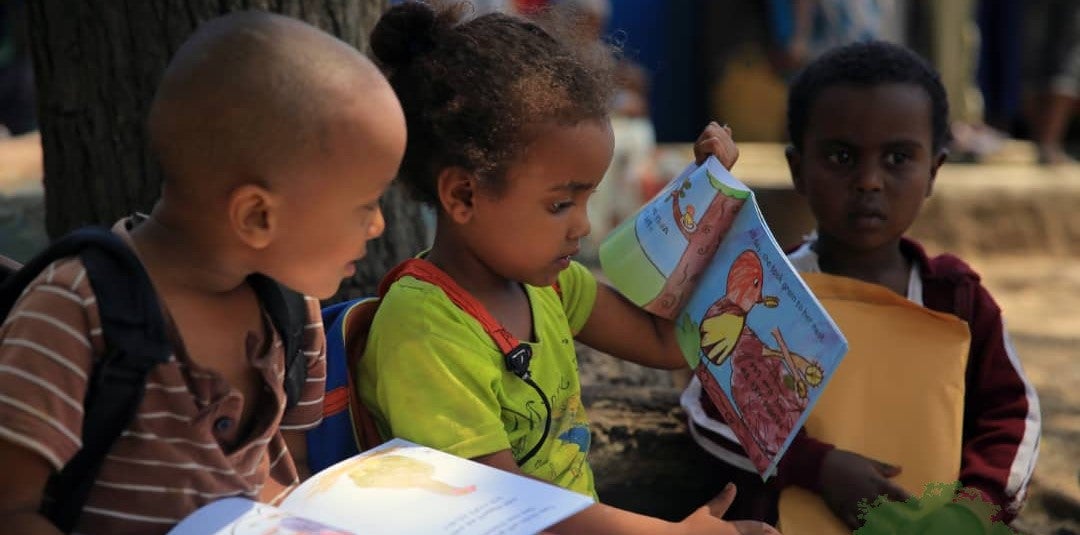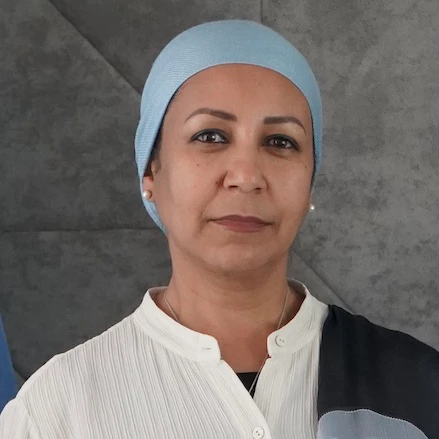 Amharic speaking children at IDP site in Ataye, Ethiopia. Photo credit: Yared Shumete/Ethiopia Reads
Amharic speaking children at IDP site in Ataye, Ethiopia. Photo credit: Yared Shumete/Ethiopia Reads
Learning to read can be challenging. Learning to read in a language you don’t understand is daunting. Add to this being forced to flee your home, during a pandemic, learning to read seems nearly impossible. But when a small NGO printed and distributed 45,000 books in 3 Ethiopian languages to displaced families in Ethiopia, there was a “flashlight beam” of hope. This is what Ethiopia Reads did in the Fall of 2021, successfully distributing these books in less than a month. (Watch video here).
Books have a magical element to them: their pages transport readers to new places, even other worlds and times. Beyond the temporary joy and distraction for the internally displaced families who received them, books offer an opportunity for children to learn to read and represent a brighter future for them.
Books are Magic: The Evidence
The mere presence of books in homes is powerful: A study across 27 countries found growing up in homes with many books is associated with 3 years more schooling on average than children from bookless homes, controlling for their parents’ education, occupation and income. According to the study authors, this “book advantage” is equal to having parents that are college-educated, or a parent with a white-collar job. Of course, the books must be in languages that kids speak and understand. As per the recent World Bank Flagship Paper “Loud and Clear”, when learning opportunities like reading books are in mother tongue, children learn more, including other languages, and are more likely to stay in school. For this reason, in this small partnership with Ethiopia Reads, the Read@Home team printed the books in Somali, Afaan Oromo, and Amharic.
The marginal value of books is even greater in contexts where nearly none are found. The families that Ethiopia Reads served are escaping civil strife, living in camps for Internally Displaced People (IDPs). With few opportunities to attend school, these book bundles (packets of 3) represent more than a momentary escape from the challenges of displacement: as reported by the photographer behind the pictures featured here, the books bring a sense of hope – even if just a “flashlight beam” – and possibility for the future. In the words of one parent: “The biggest help we need from you is education for our children, because only an educated person can get to a better place”.
Unlocking the Magic: Working with Parents, and the Importance of Mother Tongue
Books don’t achieve impact on their own, however. Helping caregivers accompany children in their reading is a crucial aspect to the Read@Home approach. To do so, the Ethiopia Reads team included some simple instructions to caregivers, including questions to ask before, during, and after reading together. The team will return to the IDP areas in to see how families are using the books and hear from parents and caregivers how the guidance can be improved, including for those parents that may not have had the chance to learn to read themselves.
From Flashlight Beam to Ray of Sunlight: A Solution to be Brought to Scale
We are deeply grateful to our partners in Ethiopia for achieving so much (printing and distributing 45,000 books, along with instructions to caregivers and follow up evaluation) with relatively little funding ($50,000), in record time (4 weeks). Ethiopia Reads has been sourcing, printing and distributing hundreds of thousands of attractive children’s books in Ethiopian languages, accompanied by educator training, to public schools for several years, so were well-prepared. The secret to Ethiopia Reads’ efficiency is due to their:
- Strong partnership with the Ministry of Education, at national and district levels, including having titles that were pre-approved by the government for distribution
- Existing relationships with a panel of printers that allow them to quickly mobilize competitively priced print runs
- Licensing rights to the Ready Set Go titles provided at reasonable cost by the Open Hearts Big Dreams Fund
- Creativity in finding partners to help them reach IDP camps
- Propensity to listen to those communities they seek to serve, to best understand what will work to help kids learn to read
With an estimated 3.5 million IDPs and over 900,000 refugees living in Ethiopia, the need for providing learning opportunities – and hope – to these families is simply tremendous. With new delivery pathways being explored, we hope this small beam can grow into a proper ray of sunlight, ushering in a bright future for these displaced children.
With thanks to Amanda Devercelli, Marcela Gutierrez Bernal, Kirill Vasiliev, Fitsum Zewdu Mulugeta, and out partners at Ethiopia Reads for their contributions to the blog, and especially to the project.



Join the Conversation